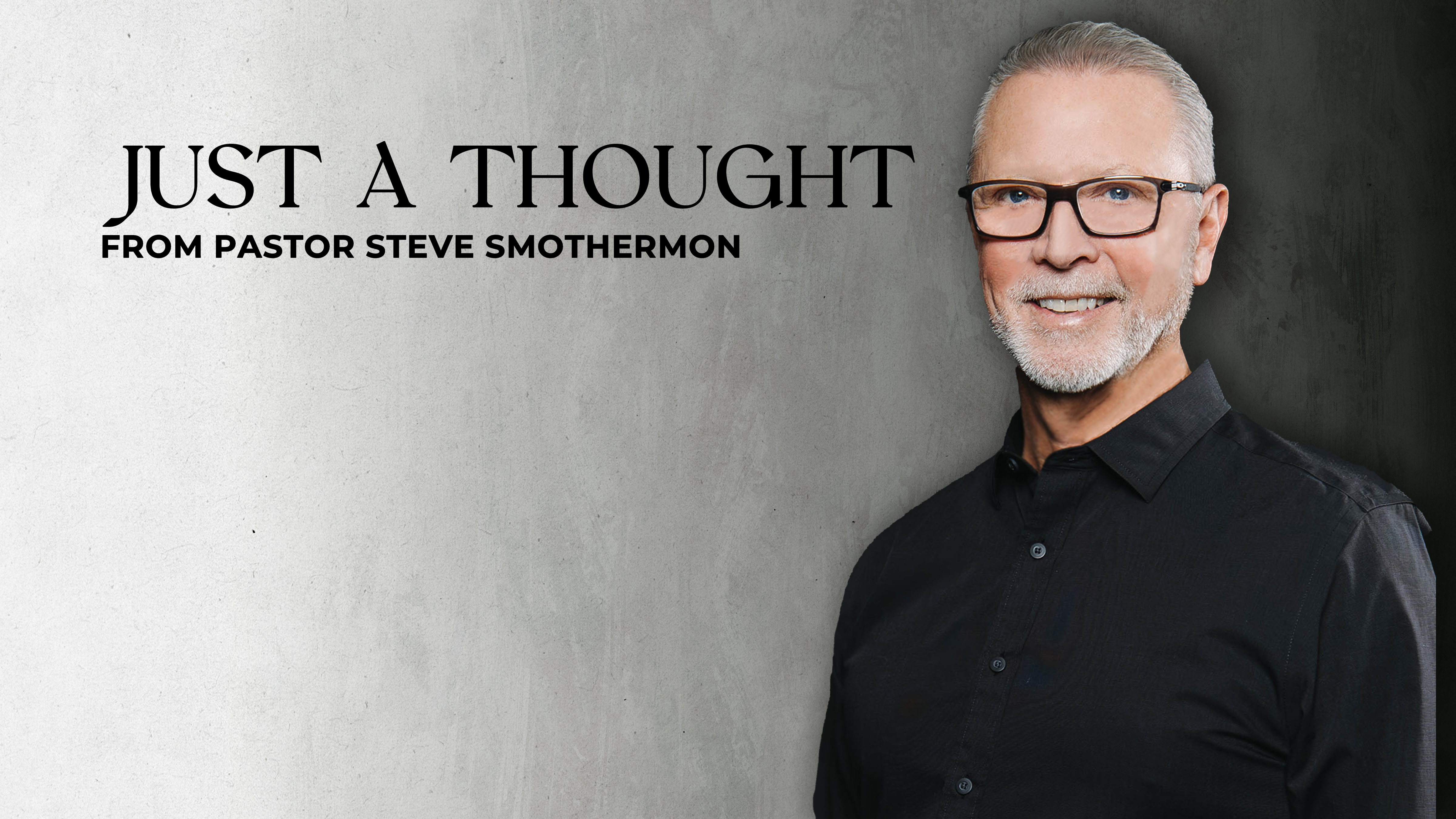Subscribe To Pastor Steve's Weekly Just A Thought
God's Sovereignty
God’s Sovereignty
When people say, “God is in control,” what do they mean? I believe most of the time they mean that if something happens, good or bad, it was God’s will — because He is in charge of everything — He is sovereign. The problem with this thinking is, it’s not true. God is never the author of bad.
Our free will:
The word “sovereign” means: supreme in power or authority, not influenced by outside sources. But most people believe it means God is in control of every aspect of our lives and the lives of everyone. The truth is: if God is in complete control, then we don’t have free will. And we know God gave us all free will.
God’s will:
2 Peter 3:9b – not wishing for any to perish, but that all should turn to repentance. Matthew 7:13 — You can enter God’s kingdom only through the narrow gate. The highway to hell is broad, and its gate is wide for the many who choose that way. We can see God’s will is that no man perish.
Our choice:
So, if He is control of everything, why do more people reject Him than accept Him? The reason is that God gave us all free will. Our choices matter. God has a perfect plan for all of our lives. But we have to choose to follow Him and His word to experience that plan.
We are responsible for our choices, our decisions. It’s those choices that determine whether or not we receive God’s blessings — whether or not we receive His salvation. Our choice!
Just a thought,
PSS
Published on Tuesday, June 6, 2017 @ 7:23 AM MDT
Managing Our Emotions
To walk with God continually, we need to become steadfast.
Know your beliefs:
Steadfastness, or being steadfast, is being a person who knows what they believe and never backs down from it. We must know what we believe and whom we believe in. Hebrews 10:23 NLT says, Let us hold tightly without wavering to the hope we affirm, for God can be trusted to keep His promise. When we understand and believe that, we will become steadfast — never wavering from the truth.
Be consistent:
Steadfastness, I believe, will produce consistency. It will lead us to becoming consistent in our attitudes, consistent in our emotions. Moodiness is a lack of being consistent. We’re up one moment, down the next. We’re making decisions, one moment flying off the handle, and the very next moment calm and making calculated decisions.
Keep believing God:
Being steadfast is being constant in our beliefs. In other words, when things go badly, we don’t get too low; when things go well, we don’t get too excited. Steadfastness keeps on believing God, trusting God, and continuing to do the word of God. Why? Because we know God keeps His promises, and He is always for us.
So let’s believe God and cultivate the fruit — characteristics of being steadfast. It will help us in every area of our lives.
Just a thought,
PSS
Published on Tuesday, May 30, 2017 @ 6:58 AM MDT
It's Not About Us
As we go about our day, dealing with all the issues of life that confront us, serving people is something we should keep in the forefront of our minds.
Do not be self-absorbed:
Whether it’s family, work, relationships, or anything else, we should think of people first. I’ve observed that those who serve others in some capacity are usually happier than those who live for themselves. It keeps things in perspective.
Serve and help others:
When we visit a young person who’s fighting for their life against a sickness, it can cause those seemingly impossible and big problems in our lives to appear insignificant. A selfish life will always cause problems to be magnified in our own eyes and mind. Serving others will put things in perspective. When we see someone who is disabled or less fortunate, let’s remind ourselves to serve and help others.
We should be unselfish people with our lives. We will find it rewarding and well worth it.
Just a thought,
PSS
Published on Tuesday, May 23, 2017 @ 8:15 AM MDT
Choose Your Fear
Choose Your Fear
Fear is defined as: to expect or worry about (something bad or unpleasant).
Innate fears vs acquired fears:
We are born with two fears: fear of falling and fear of loud noises. All other fears are learned. We are taught to fear or we have experienced something in our lives that created fear. Fear is said to be an acronym for false evidence appearing real. One study found that sixty percent of things feared never take place. Ninety percent of things feared are considered insignificant issues. Six million three hundred thousand Americans have a diagnosed fear. God says He has not given us a spirit of fear and timidity, but of power, love, and self-discipline (NLT).
Godly fear:
There is another fear that is healthy — it’s the beginning of wisdom. That is the fear of the Lord. This fear is not being afraid; it’s not fear of His wrath or a fear of eternal damnation. It is an affection for God — a reverence of Him. This is a healthy fear which is consistent with strong faith, great joy, and true courage. It’s an awesome dread of displeasing God — a deep respect of God.
Choosing your fear:
People today believe they can become wise by life experience and academic knowledge alone. You get to choose your fear. One choice leads to the fear or fears the world brings: fear of flying, fear of failure, fear of death, fear of the dark, etc. There are so many of them. We can and will overcome our fears when we submit to the fear of God, when we serve Him because He is good and we respect Him enough to purpose to live by His word. The fear of the Lord is given to us when we receive Jesus as our Lord and Savior. The fear of the Lord has no bad consequences with it — only hope.
So, let’s choose the fear that will bring blessing to our lives — the fear of the Lord.
Just a thought,
PSS
Published on Tuesday, May 16, 2017 @ 8:16 AM MDT
Doubt vs Unbelief
Have you ever doubted? I know I have. Doubt means: to call into question the truth of; to be uncertain or in doubt about; to lack confidence in, distrust.
Asking the whys:
Doubt goes in two directions. The first direction it leads to is unbelief. Unbelief is the opposite of faith. The other direction it takes leads you to the truth, to a greater belief in God and His word.
George Bernard Shaw said, “Any belief worth having must survive doubt!” We doubt — don’t we? We ask the whys: Why did my friendship end? Why did God not help me when I was being abused? Why can’t I find a spouse? This is all doubt.
Blaming God:
The children of Israel believed God did good and evil. But we should know better. We know God gives us only good and perfect gifts, and it is the devil who does evil. But as the Israelites did, people today blame God. We all doubt at one time or another. We will at times blame the circumstances — they are too hard or too big.
Believing God:
The truth is: doubt at times will grow into great understanding if we never quit seeking God. When someone allows doubt to become unbelief, they are really questioning God’s ability to perform. If you doubt yourself too long, then it turns into an unbelief of yourself — you will lose hope. We may all doubt ourselves, our abilities, but we should never allow it to turn into disbelief.
There is always hope with, and in, God.
Just a thought,
PSS
Published on Tuesday, May 9, 2017 @ 7:27 AM MDT

Latest Media
Check out our latest sermons, stream church service live or see other videos and podcasts.

